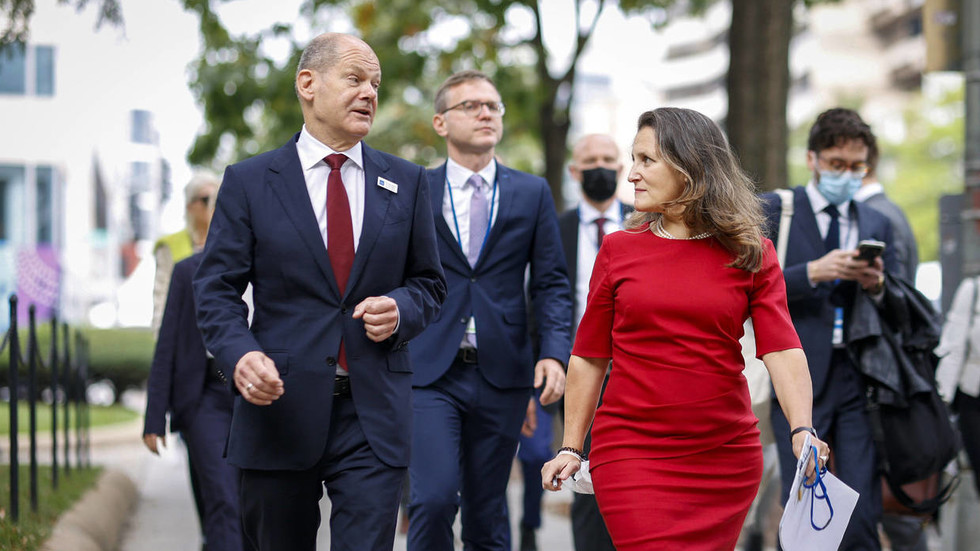The political landscape in both Germany and Canada has recently witnessed significant upheavals. German Chancellor Olaf Scholz has taken an unconventional step by proposing a no-confidence vote against himself, recognizing the disarray within his government. His coalition, dubbed the “traffic light” coalition, is in disarray after his finance minister, Christian Lindner from the Free Democratic Party, refused to support Scholz’s proposed spending initiatives, particularly regarding Ukraine. The fallout from this political rift has been considerable, resulting in a lack of necessary majority support for Scholz, putting his mandate at risk. The increasing internal dissent reflects deeper ideological divides within the government, mirroring the growing tensions over how to handle economic issues in light of Germany’s recent economic struggles and its response to external pressures.
The conflict between Scholz and Lindner highlights the challenges of political alignment within a coalition, especially regarding budgetary priorities and foreign policy commitments. The German government’s decision to pursue aggressive military and financial support for Ukraine, influenced by EU mandates, has left it vulnerable to economic backlash. Scholz’s call for a self-imposed no-confidence vote can be viewed as an acknowledgment of his leadership’s ineffectiveness, compounded by external realities such as the rising costs of energy and defense. The broader implications of such a move suggest a looming political crisis that extends beyond Scholz himself, indicating potential instability in Germany’s governance.
In Canada, Finance Minister Chrystia Freeland’s abrupt resignation adds another layer of complexity to the current political climate. Her departure came just hours before an anticipated deficit announcement that far exceeded projections, implying significant fiscal mismanagement under her leadership. Freeland claimed that she was pushed out rather than voluntarily stepping down, which casts doubt on the stability of Prime Minister Justin Trudeau’s administration. The emerging narrative suggests that Freeland’s tenure is characterized by the promotion of ineffective financial strategies and misjudgments, particularly regarding inflation and the rising cost of living, which have escalated under her watch. Her resignation has been interpreted as a key indicator of the deteriorating confidence in both her capabilities and the overall direction of Canada’s fiscal policy.
Freeland has faced criticism for her handling of the economy, as many Canadians are experiencing significant financial constraints. Her emphasis on a “vibecession” as a term to describe the economic situation has been met with skepticism, indicating a disconnect between her analysis and the lived experiences of citizens. Moreover, her prior actions during the COVID-19 pandemic, particularly concerning vaccine mandates and the corresponding financial repercussions, have left a bitter taste among many Canadians. The perception of her as an elitist figure aligned with a globalist agenda has contributed to public discontent, leaving political commentators and citizens alike questioning her qualifications to address the pressing economic challenges facing the country.
As the political turmoil unfolds, speculation surrounds Prime Minister Trudeau’s future, with some suggesting he may consider following Freeland’s lead and stepping down himself. Trudeau’s administration has already experienced significant scrutiny due to rising inflation rates and a less-than-stellar recovery following the pandemic. The potential resignation of key figures in his cabinet raises concerns about the stability of his government and the efficacy of its economic policies. The mutual withdrawals of Scholz and Freeland signal not just a personal crisis for these leaders, but a broader trend of dissatisfaction with the establishment’s handling of complex political and economic realities.
The interconnectedness of these political shifts in Germany and Canada reflects a larger narrative about the failings of centrist and leftist agendas in addressing contemporary challenges. Scholz’s call for self-removal and Freeland’s hasty exit indicate a lack of confidence in these leaders to navigate their nations through tumultuous waters marked by outside pressure and domestic strife. If these Western leaders continue to abandon ship, it may necessitate a reevaluation of policy frameworks and ideological commitments that have historically guided their governance—a change that could resonate with citizens frustrated by mounting crises.
In conclusion, the exodus of prominent political figures in Germany and Canada serves as a powerful indicator of the growing discontent among citizens towards existing leadership and policy frameworks. As culpabilities mount in both countries regarding economic management and adherence to globalist agendas, the potential for significant political shifts emerges. Schulz’s and Freeland’s situations highlight not only their personal struggles but also a broader crisis within Western governance—one that could result in a dramatic reassessment of leadership priorities ahead of key elections. For the future of both nations, the denouement of these political narratives will likely shape public trust and governmental legitimacy in unprecedented ways.

